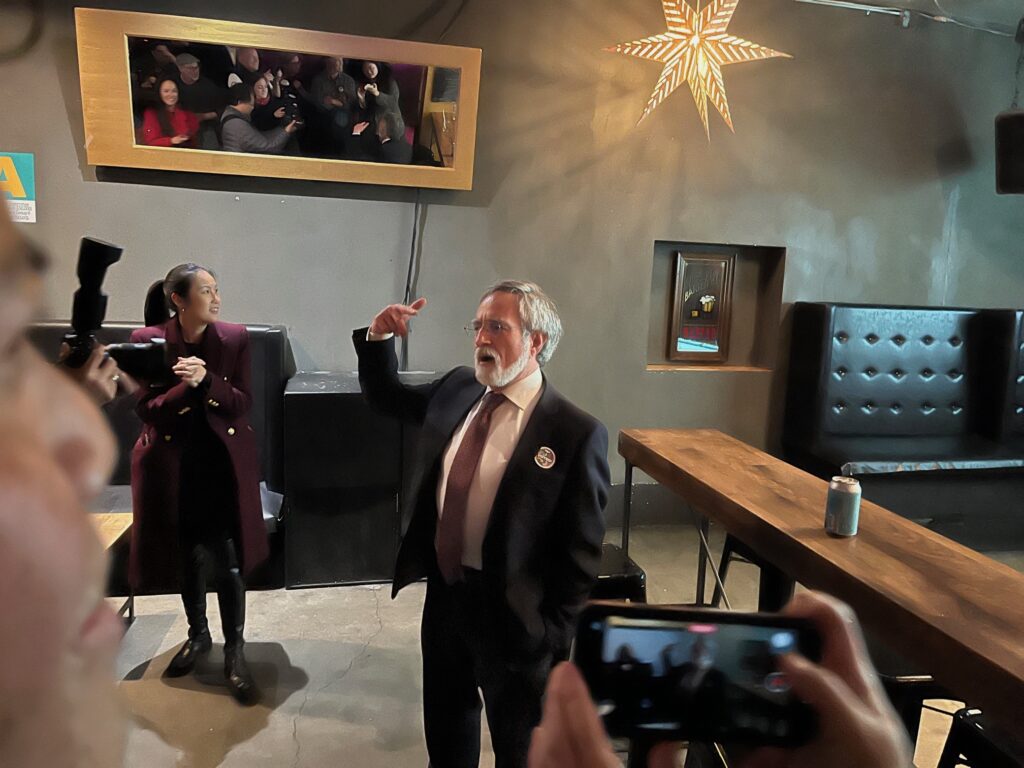The San Francisco Chronicle and The San Francisco Standard have both declared that this is no longer a progressive city.
That seems a bit premature to me.
The early results from last night’s election do, indeed, mostly favor the wing of the Democratic Party that calls itself “moderate” but is actually, on economic issues, pretty conservative. (I call neoliberals conservatives.)
Ballot measures supported by the mayor that do things like give the police more authority to spy on us all and require drug screening for welfare recipients are passing easily.

The conservatives are heading for control of the Democratic County Central Committee.
But let’s hold on a moment here before we pronounce a dramatic shift in local politics.
These results are based on a turnout of 20.9 percent. Four out of every five registered voters have not had their votes counted. There are, as of Wednesday, more ballots still outstanding (110,000) than have been counted so far.
And according to all the maps I have seen, the early ballots, the ones they count first, are overwhelmingly from the most conservative parts of the city.
Look at the data: 22.5 percent of the Democratic votes have been counted. But almost 29 percent of the Republican votes are in. One out of every ten votes counted so far was cast by a Republicans, who represent 7.4 percent of the registered voters.
The early returns always skew conservative, since the more conservative voters tend to turn their ballots in early.
I’m not suggesting that the final results will change dramatically—but only a few hundred votes separate the winners and losers in the DCCC, and it’s likely that at least a few more progressives will make the cut.
In the end, though, we will have a fairly conservative outcome—largely because of who voted. The Chron noted that in an update this afternoon. The Department of Elections will release more results Thursday at 4pm.
As I said last night, many of the conservative voters turn out anyway, and the mayor’s attacks on the poor and promotion of the police brought out more of those voters. And the billionaire money made a huge difference, particularly in the DCCC race.
The biggest problem for the progressives, particularly younger voters, was the lack of anything at the top of the ticket to inspire them to vote.
People on the left in San Francisco, by and large, are not happy with Joe Biden. So, either as a protest or as a matter of disinterest, some of then stayed home.
Check out this chart, from the Department of Elections. Turnout is highest when there’s something at the top of the ticket—and that is also when progressives do best.
In November, if there’s a candidate progressives can support running for mayor, there’s a good chance that the presidential race and the mayor’s race will bring out enough voters on the left to make a big difference in the supes races and on ballot measures.
The impact of the tech workers who have moved to town in the past ten years is becoming real. At first, they weren’t voting; now, apparently, they are. We all knew this was going to happen; as longtime activist Calvin Welch likes to say, “who lives here, votes here,” and as displacement forces out the working class and communities of color, the city gets more conservative. The Yimby pro-market approach to issues like housing, and the pro-police approach to social problems, has become more appealing to the wealthier residents.
Maybe wave after wave of gentrification will ultimately usher in a neoliberal majority on the Board of Supes and a more conservative body politic.
But I’ve been around a long time. In the 1980s, the city was run almost entirely by economic (and often social) conservatives like Mayor Dianne Feinstein, who had more than six call-up votes on an at-large board. Frank Jordan, a former police chief, was elected mayor in 1991. In the later 1990s, Mayor Willie Brown controlled the supes and his pro-developer politics dominated the city. The left was always in the minority and on the ropes.
Gavin Newsom get elected mayor by attacking poor people with a ballot measure called “Care not Cash,” which passed with a clear majority.
The DCCC used to be controlled by the old Brown-Burton Machine, which made sure that progressive Harry Britt, the heir to Harvey Milk’s supervisorial seat, lost a generational, defining Congressional race to machine candidate Nancy Pelosi.
Conservative election outcomes are not new. Neoliberal mayors have run San Francisco for much of past half century.
But recent years have shown a remarkable uprising of progressive candidates and causes. The young, organized, diverse left in this city is as strong as I’ve seen it.
So after all this time, I’m not ready to write the obituary for the progressive city.



